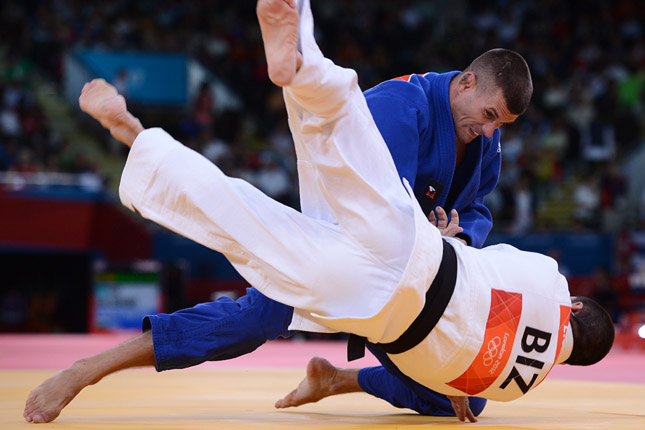Gokyo no Waza
·
GOKYO NO WAZA (Five sets of techniques)
The Gokyo no Waza as the standard syllabus of Judo throws originated in 1895. From 1920 to 1982 the Kodokan Gokyo no Waza was made up of 40 throws in 5 groups and these were all of the throwing techniques in the Kodokan syllabus. Around the 100th anniversary of the Kodokan (1982) a group of 8 traditional Judo throws were recognized that had been taken out in 1920, and 17 newer techniques were recognized as official Kodokan Judo throws (called the Shinmeisho no Waza). In 1997 the Kodokan added the last two additional Judo throws to the Shinmeisho no Waza. The following are the only throwing techniques (nage waza) currently recognized by the Kodokan.
|
|
1982 Modern Gokyo no Waza
Dai Ikkyo (Ist group)
1. Deashi Harai (Forward Foot Sweep)
2. Hiza Guruma (Knee Wheel)
3. Sasáé Tsurikomi Ashi (Lifting Puliing Ankle Block)
4. Uki Goshi (Floating Hip)
5. Osoto Gari (Large Outer Reaping)
6. O Goshi (Large Hip Throw)
7. Ouchi Gari (Large Inner Reaping)
8. Seoi Nage (Two Arm Shoulder Throw)
Dai Nikyo (2nd group)
1. Kosoto Gari (Small Outside Reap)
2. Kouchi Gari (Small Inner Reap)
3. Koshi Guruma (Hip Wheel)
4. Tsurikomi Goshi (Lifting Puliing Hip)
5. Okuriashi Harai (Following Foot Sweep)
6. Tai Otoshi (Body Drop)
7. Harai Goshi (Sweeping Hip Throw)
8. Uchi Mata (Inner Thigh Throw)
Sankyo (3rd group)
1. Kosoto Gake (Small Outside Hook)
2. Tsuri Goshi (Lifting Hip)
3. Yoko Otoshi (Side Drop)
4. Ashi Guruma (Lég Wheel)
5. Hane Goshi (Spring Hip Throw)
6. Harai Tsurikomi Ashi(Lifting Puliing Foot Sweep)
7. Tomoe Nage (Circle Throw)
8. Kata Guruma (Shoulder Wheel)
Yonkyo (4th group)
1. Sumi Gaeshi (Corner Reversal)
2. Tani Otoshi (Valley Drop)
3. Hane Makikomi (Spring Wrap-around Throw)
4. Sukui Nage (Scoop Throw)
5. Utsuri Goshi (Changing Hip Throw)
6. O Guruma (Large Wheel)
7. Soto Makikomi (Outer Wrap Around)
8. Uki Otoshi (Floating Drop)
Gokyo (5th group)
1. Osoto Guruma (Large Outer Wheel)
2. Uki Waza (Floating Technique)
3. Yoko Wakare (Side Separation)
4. Yoko Guruma (Side Wheel)
5. Ushiro Goshi (Rear Hip Throw)
6. Ura Nage (Rear Throw)
7. Sumi Otoshi (Corner Drop)
8. Yoko Gake (Side Hook)
Habukareta Waza (preserved techniques from 1895 gokyo)
1. Obi Otoshi (Beit Drop)
2. Seoi Otoshi (Shoulder Drop)
3. Yama Arashi (Mountain Storm)
4. Osoto Otoshi (Large Outer Drop)
5. Daki Wakare (High Lift and Separate)
6. Hikikomi Gaeshi (Pulling-in Reversal)
7. Tawara Gaeshi (Rice Balé Reversal)
8. Uchi Makikomi (Inner Wraparound)
Shinmeisho No Waza (newly accepted techniques)
1. Morote Gari (hand technique)
2. Kuchiki Taoshi
3. Kibisu Gaeshi (Heel Trip Reversal)
4. Uchi Mata Sukashi (hand technique)
5. Daki Age (High Lift)
6. Tsubame Gaeshi (Swallow's Flight Reversal)
7. Kouchi Gaeshi
8. Ouchi Gaeshi
9. Osoto Gaeshi
10. Harai Goshi Gaeshi
11. Uchi Mata Gaeshi
12. Hane Goshi Gaeshi
13. Kani Basami (Flying Scissors)
14. Osoto Makikomi (Major Outer Wrap Around)
15. Kawazu Gak§
16. Harai Makikomi (Sweeping Wraparound)
17. Uchi Mata Makikomi (Inner Thigh Wrap Around)
18. Sódé Tsurikomi Goshi (Sleeve Lifting Puliing Hip)
19. Ippon Seoinage (One Arm Shoulder Throw)
1920 Gokyo no Waza
|
Dai Ikkyo (1st group)
|
Dai Nikyo (2nd group)
|
Dai Sankyo (3rd group
|
Dai Yonkyo (4th group)
|
Dai Gokyo (5th group)
|
|
De-ashi-harai Hiza-guruma Sasae-tsurikomi-ashi Uki-goshi O-soto-garí O-goshi
O-uchi-gari Seoi-nage
|
Ko-soto-gari Ko-uchi-gari Koshi-guruma Tsurikomi-goshi Okuri-ashi-harai Tai-otoshi
Harai-goshi Uchi-mata
|
Ko-soto-gake Tsuri-goshi Yoko-otoshi Ashi-guruma Hane-goshi Harai- tsurikomi-ashi Tomoe-nage Kata-guruma
|
Sumi-gaeshi Tani-otoshi Hane-makikomi Sukui-nage Utsuri-goshi O-guruma
Soto-makikomi Uki-otoshi
|
O-soto-guruma Uki-waza Yoko-wakare Yokoguruma Ushiro-goshi Ura-nage
Sumi-otoshi Yoko-gake
|
1895 Gokyo no Waza
|
Dai Ikkyo (1st group)
|
Dai Nikkyo (2nd group)
|
Dai Sankyo (3rd group)
|
Dai Yonkyo (4th group)
|
Dai Gokyo (5th group)
|
|
Hiza-guruma Sasae-turikomi-ashi Uki-goshi Tai-otoshi O-soto-gari De-ashi-harai Yoko-otoshi
|
Sumi-gaeshi O-goshi Ko-soto-gari Koshi-guruma Seoi-nage Tomoe-nage Tani-otoshi
|
Okuri-ashi-harai Harai-goshi Ushiro-goshi Ura-nage Uchi-mata Obi-otoshi Hane-goshi
|
Uki-otoshi Uki-waza Daki-wakare Kata-guruma Hiki-komi-gaeshi Soto-makikomi Tsuri-goshi Utsuri-goshi
O-soto-otoshi Tawara-gaeshi
|
Yoko-guruma Yoko-wakare Uchi-makikomi Ko-uchi-gari Ashi-guruma Seoi-otoshi Yoko-gake Harai-tsurikomi- ashi Yama-arashi O-soto-guruma Tsurikomi-goshi
|
For READING
· Geesink, Anton, Gokyo: principles of Judo”, London, United Kingdom, W. Foulsham, 1967, 96p, ISBN 0572004516

